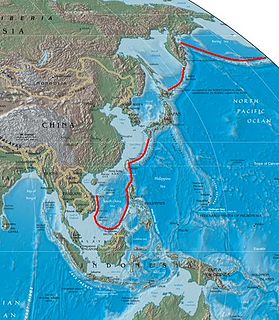Related Research Articles

National security, or national defence, is the security and defence of a sovereign state, including its citizens, economy, and institutions, which is regarded as a duty of government. Originally conceived as protection against military attack, national security is widely understood to include also non-military dimensions, including the security from terrorism, minimization of crime, economic security, energy security, environmental security, food security, and cyber-security. Similarly, national security risks include, in addition to the actions of other nation states, action by violent non-state actors, by narcotic cartels, and by multinational corporations, and also the effects of natural disasters.

The Indo-Pacific, sometimes known as the Indo-West Pacific or Indo-Pacific Asia, is a biogeographic region of Earth's seas, comprising the tropical waters of the Indian Ocean, the western and central Pacific Ocean, and the seas connecting the two in the general area of Indonesia. It does not include the temperate and polar regions of the Indian and Pacific oceans, nor the Tropical Eastern Pacific, along the Pacific coast of the Americas, which is also a distinct marine realm.

The People's Republic of China has developed and possesses weapons of mass destruction, including chemical and nuclear weapons. The first of China's nuclear weapons tests took place in 1964, and its first hydrogen bomb test occurred in 1967. Tests continued until 1996, when China signed the Comprehensive Test Ban Treaty (CTBT). China has acceded to the Biological and Toxin Weapons Convention (BWC) in 1984 and ratified the Chemical Weapons Convention (CWC) in 1997.

Andrew W. Marshall was an American foreign policy strategist who served as director of the United States Department of Defense's Office of Net Assessment from 1973 to 2015. Appointed to the position by President Richard Nixon, Marshall remained in office during all successive administrations that followed until his retirement on January 2, 2015. He was succeeded in the role by James H. Baker.

The military budget of China is the portion of the overall budget of China that is allocated for the funding of the military of China. This military budget finances employee salaries and training costs, the maintenance of equipment and facilities, support of new or ongoing operations, and development and procurement of new weapons, equipment, and vehicles. Every March, as part of its annual state budget, China releases a single overall figure for national military expenditures.

The Australian Strategic Policy Institute (ASPI) is a defence and strategic policy think tank based in Canberra, Australian Capital Territory, founded by the Australian government and funded by the Australian and overseas governments, industry and civil society groups.
Pervaiz Iqbal Cheema was a Pakistani political scientist, cricketer, and a professor of International Relations and was last working as Dean, Faculty of Contemporary Studies, National Defence University, Islamabad - Pakistan.
The Defence Industrial Strategy (DIS) is a United Kingdom government policy which was published as a white paper on 15 December 2005. The purpose of the DIS is stated to be to ensure that the UK armed forces are provided with the equipment they require, on time, and at best value for money. This is achieved through the maintenance of sovereign capabilities, i.e. the capabilities of UK companies in key defence areas.
MDPI, acronym of Multidisciplinary Digital Publishing Institute, is a publisher of open access scientific journals. Founded by Shu-Kun Lin as a chemical sample archive, it publishes over 390 diverse, peer-reviewed, open access journals and is continuously expanding its portfolio. MDPI is the largest open access publisher in the world and the fifth largest publisher overall in terms of journal paper output. The number of published papers has been growing significantly in the last decade with year over year growth of over 50% in 2017, 2018 and 2019.
Proactive cyber defence means acting in anticipation to oppose an attack through cyber and cognitive domains. Proactive cyber defence can be understood as options between offensive and defensive measures. It includes interdicting, disrupting or deterring an attack or a threat's preparation to attack, either pre-emptively or in self-defence. Common methods include cyber deception, attribution, threat hunting and adversarial pursuit. The mission of the pre-emptive and proactive operations is to conduct aggressive interception and disruption activities against an adversary using: psychological operations, managed information dissemination, precision targeting, information warfare operations, computer network exploitation, and other active threat reduction measures. The proactive defense strategy is meant to improve information collection by stimulating reactions of the threat agents and to provide strike options as well as to enhance operational preparation of the real or virtual battlespace. Proactive cyber defence can be a measure for detecting and obtaining information before a cyber attack, or it can also be impending cyber operation and be determining the origin of an operation that involves launching a pre-emptive, preventive, or cyber counter-operation.

Karl Winfrid Eikenberry is a retired United States Army lieutenant general who served as the U.S. Ambassador to Afghanistan from April 2009 to July 2011. From 2011 to 2019, he was the Director of the U.S. Asia Security Initiative at the Walter H. Shorenstein Asia-Pacific Research Center and a Stanford University professor of the practice; a member of the Core Faculty at the Center for International Security and Cooperation; and an affiliated faculty member at the Freeman Spogli Institute for International Studies, Center on Democracy, Development and the Rule of Law, and The Europe Center.

Alan Anthony Dupont is an Australian international security expert, Defence and National Security Advocate for the Northern Territory and company director who has been the CEO of geopolitical risk consultancy the Cognoscenti Group since 2016. He is also contributing national security editor for The Australian newspaper, adjunct professor at the University of New South Wales (UNSW), a non-resident senior fellow at the Atlantic Council in Washington, and the Lowy Institute in Sydney and a fellow at the Hinrich Foundation.

The Academy of Military Sciences is the highest-level research institute of the People's Liberation Army of China. It is headquartered in Beijing. Its president is General Yang Xuejun and Lt. General Fang Xiang is the political commissar.
Informatized warfare of China is the implementation of information warfare (IW) within the People's Liberation Army (PLA) and other organizations of the Chinese Communist Party (CCP). Laid out in the Chinese Defence White Paper of 2008, informatized warfare includes the utilization of information-based weapons and forces, including battlefield management systems, precision-strike capabilities, and technology-assisted command and control (C4ISR). However, some media and analyst report also uses the term to describe the political and espionage effort from the Chinese state.

The first island chain refers to the first chain of major Pacific archipelagos out from the East Asian continental mainland coast. It is principally composed of the Kuril Islands, the Japanese Archipelago, the Ryukyu Islands, Taiwan (Formosa), the northern Philippines, and Borneo, hence extending all the way from the Kamchatka Peninsula in the northeast to the Malay Peninsula in the southwest. Some definitions of the first island chain anchor the northern end on the Russian Far East coast north of Sakhalin Island, with Sakhalin Island being the first link in the chain. However, others consider the Aleutians as the farthest north-eastern first link in the chain. The first island chain forms one of three island chain doctrines within the Island Chain Strategy in US foreign policy.
Hugh White is an Emeritus Professor of Strategic Studies at the Strategic and Defence Studies Centre of the Australian National University in Canberra, Australia, long-time defence and intelligence analyst, and author who has published works on military strategy and international relations. He was Deputy Secretary for Strategy and Intelligence in the Australian Department of Defence from 1995 until 2000 and was the inaugural Director of the Australian Strategic Policy Institute (ASPI). His 2019 book How to Defend Australia attracted national attention after raising the proposition of re-examining the proposition of an independently nuclear-armed Australia.
The Future Offensive Air System was a study to replace the Royal Air Force's strike capability, at the time provided by the Tornado GR4. Initial operational capability was expected around 2017. The FOAS was cancelled in June 2005 and was replaced by the Deep and Persistent Offensive Capability (DPOC) requirement, which was itself cancelled in the 2010 Strategic Defence and Security Review.
The Integrated Review of Security, Defence, Development and Foreign Policy, often known as the Integrated Review, and titled as Global Britain in a Competitive Age, is a review by the British Government into the foreign, defence, security and international development policies of the United Kingdom. Described by Prime Minister Boris Johnson as "the largest review of its kind since the Cold War", the review was published on 16 March 2021.
The regulation of artificial intelligence is the development of public sector policies and laws for promoting and regulating artificial intelligence (AI); it is therefore related to the broader regulation of algorithms. The regulatory and policy landscape for AI is an emerging issue in jurisdictions globally, including in the European Union and in supra-national bodies like the IEEE, OECD and others. Since 2016, a wave of AI ethics guidelines have been published in order to maintain social control over the technology. Regulation is considered necessary to both encourage AI and manage associated risks. In addition to regulation, AI-deploying organizations need to play a central role in creating and deploying trustworthy AI in line with the principles of trustworthy AI, and take accountability to mitigate the risks. Regulation of AI through mechanisms such as review boards can also be seen as social means to approach the AI control problem.
The Science of Military Strategy (SMS) is one of the main doctrinal military publications of the People's Liberation Army (PLA) of China on the study of war. It is professionally compiled and edited by the PLA Academy of Military Science (AMS). Three editions have been published so far – 1987, 2001 and 2013. The 2013 edition is a joint work of 35 Chinese military scholars led by Major General Shou Xiaosong. The PLA defines the "science of strategy" as "the discipline of studying the overall situation and rules of war, national defense, and army building".
References
- 1 2 "China Defense White Papers—1995-2019". Andrew S. Erickson. Retrieved 2020-10-03.
- ↑ Maj Gen PK Mallick (August 2019). China’s Defence White Paper – An Analysis. Vivekananda International Foundation.
- ↑ Cordesman, Anthony H. (24 July 2019). "China's New 2019 Defense White Paper". Center for Strategic and International Studies. Retrieved 2020-10-03.
- ↑ Prashant Kumar Singh (March 2016). Changing Contexts of Chinese Military Strategy and Doctrine. MP-Institute for Defence Studies and Analyses, New Delhi. Monograph Series.
- ↑ Kanchana Ramanujam (September 2019). China’s Defence White Paper, 2019. Centre for Land Warfare Studies. Issue Brief No 192.
